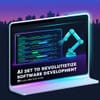Dario Amodei, CEO of Anthropic, predicts that artificial intelligence will write 90% of software code within the next three to six months. He also believes that AI may automate virtually all coding tasks within a year. This projection is based on the rapid progress AI is making in coding, with AI tools like Claude Code becoming increasingly popular among developers.
Anthropic has bundled Claude Code into its enterprise plans, allowing businesses to develop Claude Code prompts in conjunction with the Claude chatbot and integrate the command-line tool more deeply into internal data sources. The rise of "vibe coding" is changing how developers use AI, with platforms like Cursor, WindSurf, Replit, and Luvable leveraging AI as a creative partner.
As AI-powered development becomes more prevalent, developers may transition from writing code to reviewing AI-generated code and ensuring it meets user needs. Instagram co-founder Mike Krieger suggests that this shift will require developers to focus on higher-level tasks, such as ensuring the code meets user needs and is free of errors.
Amazon Web Services CEO Matt Garman believes AI may force software developers to stop coding and acquire new skills. This highlights the need for developers to adapt to the changing landscape and acquire skills that complement AI.
Recently, Anthropic released Claude Opus 4.1, which scored 74.5% on SWE-bench Verified, beating OpenAI's o3 model. This development showcases the rapid progress in AI coding capabilities and underscores the potential for AI to revolutionize software development.
As AI continues to advance, it's likely that we'll see significant changes in the way software is developed. With AI set to write a substantial portion of code, developers will need to adapt and focus on higher-level tasks that require human expertise and judgment.


